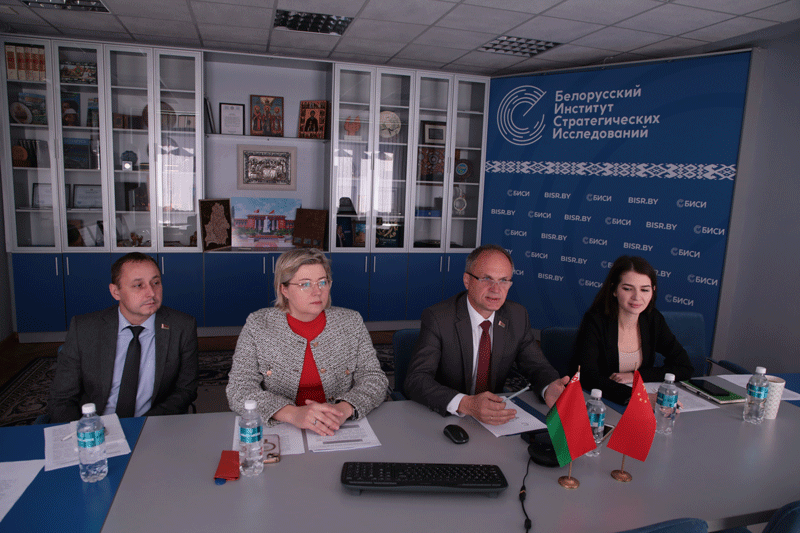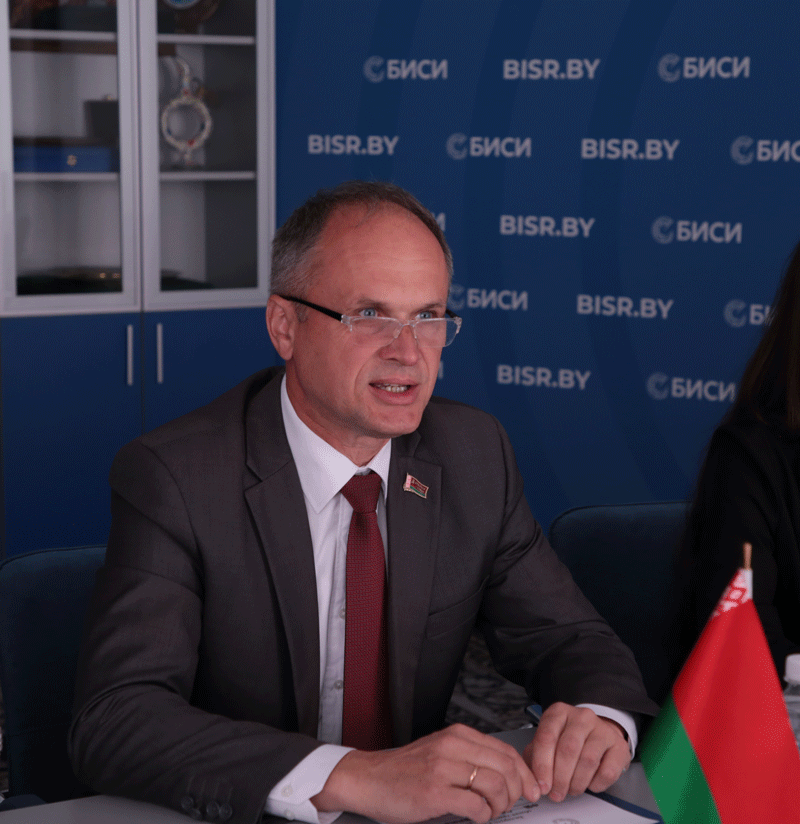It is important to preserve the historical memory of the real events of history and pass it on to future generations. This opinion was expressed during the Belarusian-Chinese round table "Belarus and China: preserving historical memory for a common future", organized by the Belarusian Institute of Strategic Research in an online format. The meeting was held as part of the analytical project "Belarus and China: a common development trajectory" and events dedicated to the 80th anniversary of the Victory of the Soviet people in the Great Patriotic War, as well as the Victory in the Chinese People's War of Resistance against Japanese Aggression and the end of World War II.
The relevance of preserving historical memory in modern conditions was emphasized in his welcoming speech by the Director of the Institute of Russian, Eastern European and Central Asian Studies at Chinese Academy of Social Sciences Sun Zhuangzhi.
In turn, BISR analyst Olga Lazorkina noted: "Victory Day is an unshakable value for every resident of Belarus. We cherish the memory of Belarusians who gave their lives for the great goal of restoring peace on earth. In our memory, the feat of the Soviet people has never been subjected to any revision. Today we see a clear tendency to change the focus of view on the outcomes of the Great Victory. This means, we need to go back to those events once again and show that not all the truth of that terrible time was fully revealed. The enormous work implemented by the Prosecutor General's Office of the Republic of Belarus has revealed many new facts about atrocities of the Nazis in our country. We work exclusively in the legal field. The parliamentarians of Belarus have adopted landmark documents on preventing the rehabilitation of Nazism and genocide of the Belarusian people."

On the eve of the 80th anniversary of Victory Day, Belarusians are increasingly convinced that the number of like-minded people is not declining, but on the contrary is growing. Those who come to Khatyn know for sure that there is only one truth about this war and today it needs to be protected.
Professor Zhao Huirong, director of the Office of Ukraine, Belarus, Moldova and the Baltic States at the Institute of Russian, Eastern European and Central Asian Studies, drew attention to the fact that people from Belarus committed many heroic deeds during the anti-Japanese war. Their deeds and names went down in history of the struggle against fascism and will forever remain in the memory of the Chinese people. Support from the Soviet Union to the Chinese Communist Party greatly contributed to the stability of the anti-Japanese national united front. Soviet troops played an important role in the defeat of the Kwantung Army in northeastern China and the end of the war.
"In a complex and unstable geopolitical situation in the world, we must remember history and prevent its falsification. Security is indivisible, we should adhere to five principles: mutual respect, openness, inclusivity and multilateralism, mutual benefit and win-win results, comprehensive consideration and assistance in shaping sustainable global security," the professor believes.
Professor Bei Wenli, Director of the Center for Belarusian Studies at East China Normal University in Shanghai, expressed his opinion: "In the crucible of the ruthless struggle against fascism, the Chinese and Belarusian peoples, like brothers in arms, shared all hardships and heaviness, supporting each other. In the current international situation, marked by rapid changes and profound upheavals, the importance of this spiritual treasure cannot be overestimated, and its relevance is only increasing. Celebrating the 80th anniversary of our common Victory, we pay tribute to the generation of victors, whose names are etched in gold letters in the chronicle of anti-fascist resistance, create reliable immunity against revisionism, resolutely rejecting any attempts to whitewash Nazism, glorify aggression and commercialize historical memory, ensure the continuity of memory for new generations, forming a "vaccine of truth" - a value system with historical truth as a compass."
During the round table, the idea that echoed, "Remembering means acting!" This principle should become a general guide to action. Only by preserving the truth about the past will we be able to build a decent future for our peoples.
BISR analyst Valentin Starichenok emphasized: "In the context of the information war unleashed against us, consistency and clarity of the state's position in preserving and protecting the memory of the past are extremely important. One of the key principles of Belarus' historical policy is anti-fascism, including rejection of radical nationalism and the inadmissibility of glorification of the Nazis and their accomplices. However, it is impossible to face the challenges of today alone. Therefore, we protect our history by joining forces with our friends, especially China, with whom we have built an all-weather and comprehensive strategic partnership. And we preserve the memory not only of the genocide of the inhabitants of the BSSR, but also of our victories."
Victory Day on May 9 has become a symbol of the country's liberation from enslavement and the transition to its revival, unleashing the creative potential of the people. In turn, the defeat of militaristic Japan in September 1945 opened a new page in the history of the Celestial Empire, which led to the unification of the country and the proclamation of the People's Republic of China on October 1, 1949.

Wang Xianju, researcher at the China Foundation for International Studies, Head and Professor at the Center for Belarus Studies at Zhejiang Shuren University, said, "The victory of the Soviet Union in the Great Patriotic War, the victory of the Chinese people in the War of Resistance against Japan and the victory in the World War against fascism are indisputable. The millions of people who sacrificed their lives for independence, freedom and peace cannot be forgotten. Historical experience shows that conducting proper education in the spirit of patriotism is very important, especially in the current difficult and serious international situation. This is especially true for the younger generation, who were born and raised in the era of peace. It is necessary to educate them with a correct understanding of patriotism and a deep understanding of the danger and cruelty of imperialist and unjust wars, to form a mindset and goals related to the love of peace, support for world peace and joint struggle for the creation of a multipolar world and a community of human destiny."
In turn, BISR analyst Siarhei Viarheichyk expressed the opinion, "The history of our two countries has many common parallels. This includes suffering from a foreign invasion, a long and persistent path to independence, the construction of socialism (although each country followed its own way, different from the other), the revival and strengthening of its own statehood. The Second World War left a particularly deep and tragic mark on our common history. The horrors of war have shaped the peaceful nature of our peoples. The basis for the joint formation of a community of shared destiny of Belarusians and Chinese is not the difference between peoples, but mutual trust and community, not only in politics and economics, but in history as well."

He shared his family history: "My grandfather Petr Viarheichyk, as a participant in the fighting with Japanese troops in Northeast China, made a significant contribution to the liberation of the Chinese people and the end of the World War. His photo in military uniform driving a combat motorcycle is always with me. It symbolizes the indissoluble bond of generations."
"The 80th anniversary of the Victory in the Great Patriotic War is an opportunity to recall our past in order to build a better future. Economic cooperation based on historical memory can become the driving force of our relations. Let this partnership, united by common values, serve as a good example for other countries," Anastasia Savinykh, BISR analyst, said. "The Belarusian bison and the Chinese dragon are symbols of power and wisdom, which are reflected in the friendship of our peoples. Together, we can not only honor the memory, but also transform it into a creative future for our countries."
In his report "Belarus and China: the memory of the war that unites" Vitaly Romanyuk, 4th year student of the Faculty of History and Intercultural Communications of Francysk Skaryna Gomel State University, focused on the commonality of the historical experience of Belarus and China, especially in the context of the Second World War. He noted the desire of both countries for a peaceful settlement of conflicts and the importance of preserving historical memory and perpetuating tragic events such as the Nanjing massacre and the Khatyn tragedy.
During the round table, it was noted that Belarusian and Chinese soldiers made a common contribution to the fight against the aggressors. China cherishes the memory of Soviet liberation soldiers. For strong cooperation between Belarus and China, friendship and the memory of mutual assistance forged in difficult times are important.
Source: BelTA

